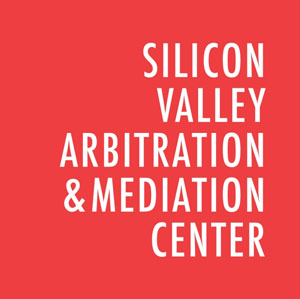History
The Silicon Valley Arbitration and Mediation Center, Inc. (SVAMC) was created in 2014 by international technology lawyer Gary Benton as a nonprofit educational foundation to support the U.S. and international global technology sector.
The initial directors and Executive Committee members were Gary Benton, Chris Compton, Scott Donahey, Jim Grossman, Robert Morrill, Susan Nycum and Les Schiefelbein. Gary Benton served as Chairman and President, the other directors served as Vice Presidents, and Robert Morrill and Jim Grossman also served as Secretary and Treasurer. Ray Bender, Michael Diamant, Naomi Jane Gray, Sherman Kahn, Jim Madison, Neil Smith and Vicki Veenker joined the leadership team in 2015; Grant Kim joined in 2016.
Under the leadership of these Founding Directors, SVAMC worked to advance the use of arbitration and mediation by companies and individuals involved in technology and technology-related business disputes in Silicon Valley, throughout the U.S. and around the world. As planned SVAMC began to collaborate with leading technology companies, law firms and universities in Silicon Valley and beyond to promote effective and efficient resolution of technology disputes and related complex business disputes. SVAMC planned, through its educational and outreach programs, to encourage and facilitate the use of arbitration and mediation as business-practical alternatives for resolution of disputes.
To achieve SVAMC’s mission, it was decided from the start that SVAMC would not administer ADR proceedings. Rather, SVAMC would cooperate with the leading local, national and international ADR providers to provide information outreach on arbitration and mediation services and choices. SVAMC soon developed a strong reputation as a reliable and independent voice in the technology sector.
One of initial plans was for SVAMC to publish a list of top tier Arbitrators and Mediator panelists who specialize in technology disputes. What became known as the “SVAMC Tech List” quickly became highly regarded in the technology sector. The original list of eighteen Tech List Appointees was published in January 2015. In addition to SVAMC founding members, the original Tech List included leading arbitrators David Sandborg in Hong Kong, Tom Brewer in Seattle, Yarko Sochynsky in Northern California. As today, Tech List appointments were peer-vetted and limited to arbitrators and mediators who (1) are members of a recognized U.S. or international arbitral or mediation panel, (2) have significant technology arbitration or technology mediation training and experience, (3) exhibit the highest ethical and quality standards and (4) actively support the efforts of SVAMC to advance ADR education and training and the use of ADR methodologies in technology and technology-related disputes.
As SVAMC membership grew, various committees and task forces were created to support the organization including a Membership Committee, Programming Committee, Marketing Committee, Outreach Committee, Tech List Selection Committee, Tech List Coordination Committee, Law Firm Task Force, International Task Force, Education Task Force, and a Young Practitioners group.
In 2017, Les Scheifelbein and Chris Compton were elected as CEO and President. With their leadership, and with the support of the SVAMC Board and committees, SVAMC expanded, particularly adding new corporate and law firm members in the U.S. and internationally. By the close of their terms, SVAMC had 27 directors, over 80 Tech List Appointees and nearly 200 members, plus additional members in the SVAMC Young Practitioner group.
SVAMC has continued to grow, diversify and expand SVAMC internationally. In 2021, Sarah Reynolds was elected CEO, Paul Cohen was elected President, and Paul Mason was elected Director General. In 2023, Jonathan Fitch was elected CEO, Teresa Garcia Reyes was elected Vice President and Paul Mason was re-elected as Director General. In 2025, Jonathan Fitch was re-elected CEO, Ucheora Onwauamaegbu was elected President, and Dorothee Schramm was re-elected Vice President.
SVAMC was the first arbitral organization to release A.I. Guidelines. Its 2024 Guidelines on the Use of A.I. in International Arbitration is the leading standard in the field.
SVAMC continues on today as the global focal point for US and international technology dispute resolution.
More Information
For more information, contact us at info@svamc.org.
More on Dispute Resolution
More on Admission to the Tech List
More on Membership
SVAMC is a California non-profit corporate foundation exempt under IRC section 501(c)(3).
